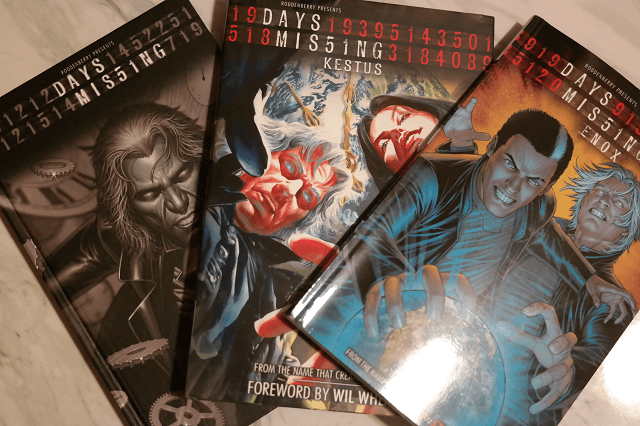A tantalizing, mind-puzzling, page-turning new comic book series called Days Missing has captivated my life for the past week now. This new series, created by Trevor Roth, written by Phillip Hester (and other contributors), and illustrated by Dave Marquez, brings you a unique introduction to a sci-fi/fantasy journey, revolved around a time-traveling Good Samaritan and the “what-if” scenarios he encounters through many of our world’s most famous historical events. If you’re a fan of science fiction and philosophical debates of why we petty humans exist and continue to exist, this comic will definitely fit right into your cosmos.
[title type=”h2″]Summary[/title]
Ever wonder what would have happened if all the near-catastrophic events in world history actually happened? What if all those potential earthquakes, wars, famines, and disease outbreaks were destined to happen until someone stepped in to stop them? What if there was an omnipresent hero, guarding us from the shadows, ensuring that humanity doesn’t fuck everything up by constantly seeking out these new threats, and distorting the way our galaxy operates, in order to find solutions to prevent tragedies from striking? Roddenberry Entertainment presents a silver fox of a man by the name of The Steward, who “folds” time so he can prevent humans from creating the tools of their own destruction. This mysterious protector must also grapple with the overbearing weight of devastating loneliness, coupled with an existential crisis of massive proportions, simultaneously bearing the weight of keeping all of humanity safe from total self-annihilation.
THE GOOD
The character himself, The Steward, was fleshed out pretty well. As the protagonist, you definitely see his character development advance through these first three volumes. I need to see more, but we definitely get a sense of why he’s choosing to protect humanity. The writers emphasize that his loneliness is a key in why he wants to save humans from themselves, however despite the repetitive dialogue of him stating it, I still don’t quite feel his true grief and sorrow of being totally isolated. I believe that they’ll definitely touch on that more as the volumes go on, as his solemnity is a huge defining characteristic.

I will say that the first volume was probably my favorite out of the three. There are a lot more stand-alone stories in this volume before the other two go into more of the main plot of the series, and these anecdotes from The Steward’s past will definitely pull you in more into the narrative. Seeing how The Steward had a hand in inspiring Mary Shelley’s infamous The Modern Prometheus (Frankenstein) was a great way to ease me into understanding how The Steward’s self-appointed mission could affect people in this specific universe.
THE BAD
The dialogue can carry on for a bit, where I had to push myself to continue reading. While I love the explanation of scientific facts in the sci-fi I read and watch, you have to space it out in order to get a better grasp of what is being explained, especially for those who aren’t astrophysicists or Dr. Harrison Wells.
While I think the art is stunning 90% of the time, every now and then the images look sloppy, unpleasant, and downright amateurish. I’m pretty sure that wasn’t done intentionally. Some of the other side and supporting characters introduced are not particularly interesting or appealing. Quite frankly, other than The Steward, in the main storyline, I really couldn’t care less about his comrades or his enemies.

As I mentioned, the first volume was great to read through, but I couldn’t help but become slightly irritated at the fact that this white-passing protagonist drops into “exotic” locations (China, Swaziland, Yucatan) and “inspires” well-known historical figures (Confucius, Cortez), essentially being the main reason why these individuals are so well known in our history books. For example, in a particular story, The Steward goes back in time to a critical moment in China, and convinces Confucius to be a brave beacon of hope, and to fight against an impending force, being the voice of courage and reason for his people to face a fate that looks ominous. This is a trope we see often: the “white-savior” coming in, saving the day, and while in the story The Steward doesn’t take any credit, but we as the reader are meant to remember that it is because of this entity that the world gained a grand individual (in this case, Confucius). While I’m sure the writers did not intend for it to come off this way, and I suppose it counts as “something” that they included historical events from cultures all around the world, these tropes and stereotypes should probably be exempt from upcoming volumes, if they desire to avoid being generic and tasteless. This may be difficult to not see in future stories, as The Steward’s main point is to convince people in history to make the “right” choices to save the rest of the world, so if they explore other countries in future volumes, it may just be a core concept to the overall story line, and I may need to revisit how it’s written then.
ALL AND ALL
This is a decent comic series overall. It’s a definite try for those really into time travel and ‘disrupting the space/time continuum’ story lines. I definitely need to see an increase of character development for all of the main characters, but overall, Days Missing is worth giving a look-see for the most loyal and devoted fans of philosophical fantasy, mystery, and science fiction. You’ll be thanking The Steward later.
Are you following Black Nerd Problems on Twitter, Facebook, Tumblr or Google+?




Show Comments